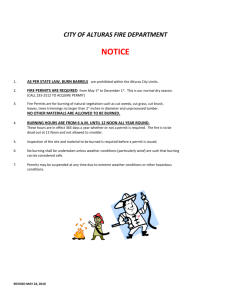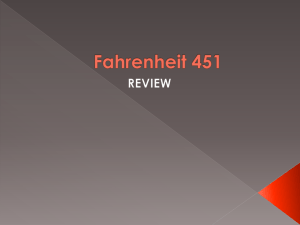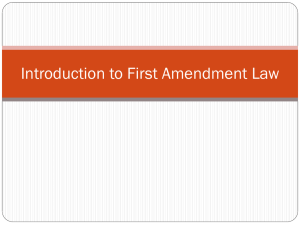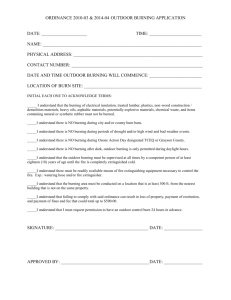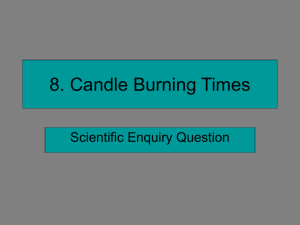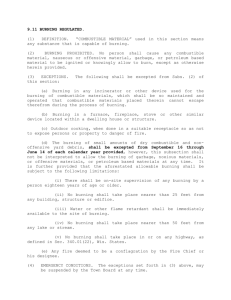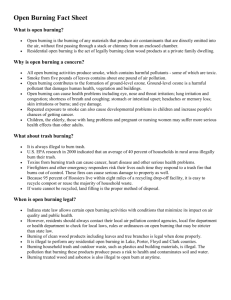The History of Book Burning
advertisement
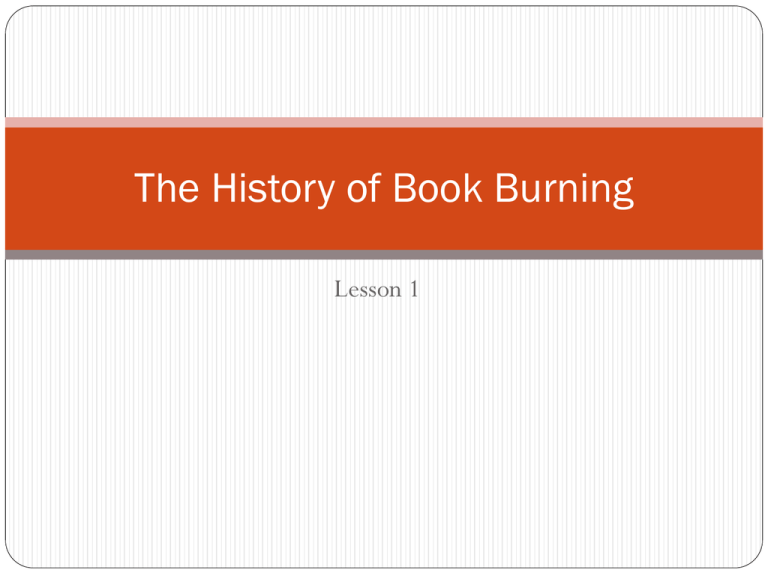
The History of Book Burning Lesson 1 Introductory prompts: When do you think people first started burning books? China, 3rd century BCE, is the first known incident. It has continued in many societies up until the present day. What motivates book burning? Can be for moral, political or religious objections to the ideas contained in the book. Today, book burning is usually ceremonial - Book burners normally aren’t trying to destroy every copy of a book, as in Fahrenheit 451. Rather, they are expressing their objections to the material in a ritualized manner. - However, there have been instances throughout history in which irreplaceable material has been destroyed - Destruction of the Library of Alexandria - Burning of books and burying scholars under China’s Quin Dynasty - Book burnings by the Nazi regime Date 213 BCE ? 292 408 392 and 640 650 1085 13th century 1233 1410 1480s 1497 1499 or 1500 1525 & 1526 1624 1760 1842 Book(s) Burned Chinese Philosophy books Sorcery scrolls Egyptian alchemical books The Sibylline Books The Alexandria libraries Book burner(s) Qur’anic texts (competing versions) Competing prayer books (at Toledo) ‘Heretical’ Cathar texts Emperor Qin Shi Huang Early converts to Christianity (at Ephesus) Emperor Diocletian Flavius Stilcho Theodosius I (392) Unknown (640) The 3rd Caliph, Uthman Followers of the King of Castile The Catholic church Maimonides philosophy John Wycliffe’s books (Jan Hus’ teaching) Non-Catholic books, especially Jewish and Arabic texts. Decameron, Ovid, and other ‘lewd’ books (in Florence) Over a million Arabic and Hebrew books (at Andalucia) Unknown-- Burnt at Montpellier, Southern France Illiterate Prague archbishop Zbyněk Zajic z Házmburka Tomas Torqumanda Girolamo Savonarola Cisneros, Archbishop of Granada William Tyndale’s English translation of the New Testament British authorities Martin Luther’s German translation of the Bible Anti-Wilhelm Tell tract (arguing that Wilhelm Tell was a myth) Religious libraries and royalist books (during the French revolution) 1842 Early Braille books (at Paris) Anti-Communist books, religious works and books in favour of 1918 Czarist history 1930-1940 Jewish, anti-Nazi and ‘degenerate’ books 1948 2000 comic books (at Binghamton, New York) 1953 Communist and ‘fellow traveler’ books 1965 Library of writer Pramoedya Anata Toer (Indonesia) 1981 Jaffna library 1988 The Satanic Verses by Salman Rushdie 1990s Books ‘contrary to the teachings of God’ at Grade Cache, Alberta 000s Harry Potter books (at various American cities) Ordered by the Pope Simon Uriel Freudenberger Robespierre Armand Dufau, director of Paris’s School for the Blind The Bolsheviks The Nazi regime Burned by children, overseen by their priests, teachers and parents Senator McCarthy Suharto Regime Sinhalese police officers Certain Muslims, who considered it blasphemous. The Full Gospel Assembly Churches Book Burning Through the Ages What kinds of books do people tend to burn? ‘Incorrect’ versions or unsanctioned translations of religious texts; ‘heretical’ texts’; holy texts of another religion; books that go against the beliefs of a new political regime; books that challenge the existing regime; books that are considered lewd, immoral, or inappropriate; Generally, what kinds of people burn books? Conquerors, governments or heads of state, religious leaders/ the Church, revolutionary leaders, or anyone who adheres strongly to a certain ideal/philosophy/belief system. Why were these books burned? They challenged ‘appropriate’ beliefs, threatened people in power, promoted ‘undesirable’ ideas, etc. Specific History: Nazi book burning On May 10, 1933 in Berlin… “The Burning of the Books” - S.A. and Nazi youth groups burned almost 20 000 books http://www.ushmm.org/wlc/en/media_fi.php?ModuleId= 10005852&MediaId=158 - The goal of this ‘event’ was to rid Germany of any book that contained “unGerman ideas” and, therefore, was unfit to read. - Joseph Goebbels, the Nazi Propaganda Minister, stated, “The future German man will not just be a man of books, but a man of character” (qtd in “May 10, 1933”). - The Nazis were pleased by the success of the burning. - Countries around the world, including America and even China and Japan, were shocked by the occurrence. - There were protests all over America, and some news media called it a ‘bibliocaust’—i.e. a holocaust of books. Follow-up Discussion (1) Why do you certain populations have allowed book burning in the past (and today)? -Political pressure, fear, mob mentality (the need to conform), patriotism, genuine dislike of the material, etc. (2) We tend to equate book burning with oppression. But is there ever any justification for banning certain books (or movies, or art)? If so, what would your criteria be? (3) Have you ever read or seen anything so offensive that you wished it would be censored? How did it make you feel? (4) Why do you think fire is used to destroy books? What is its symbolic significance? - Powerful destruction, purification, cleanliness, death and rebirth, spectacle, source of heat, etc. Lesson 1 Review Questions (1) Describe one instance in which you have observed or experienced censorship. Did you agree with it? Why or why not? (2) Do you think that certain members of society deserve to be sheltered from ‘offensive’ or ‘inappropriate’ ideas? Explain. (3) Examine your ‘Book Burning Through the Ages’ handout. Generally, who tends to burn books, and what kinds of books are burned? (4) Were you surprised by any of the banned books that appeared on the handout? If so, why? (5) What is the symbolic significance of fire as a tool for the destruction of books?
